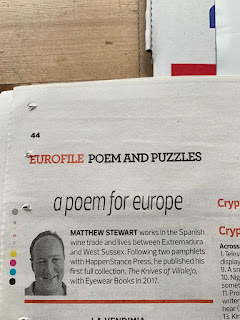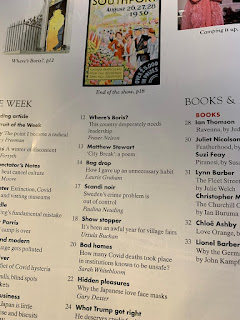Poetry blogs have taken on special significance
in 2020. As mentioned in my previous post on Rogue Strands, time might well
have speeded up this year in many respects, but many people have also had that
very same time weighing on their hands as a consequence of isolation, both in
mental and physical terms.
In other words, poetry blogs have
provided their readers with longer reads than social media posts, all alongside
more substantial content. They offer us the chance to remember we’re not alone
in the midst of this pandemic, together with the reassurance that there are other
people whose experiences mirror ours.
This year’s list of The Best U.K.
Poetry Blogs 2020 comes, as usual, with the caveat of being incomplete and
subjective, but it also includes several newcomers, some of whom have been
blogging for years but have only appeared on my limited radar this time around.
Let’s start with them…
- Julie Mellor’s blog, chatty, intimate,
yet wide-reaching and with an excellent eye for poetry.
- Ama Bolton’s barleybooks,
creativity personified.
- Hilary Menos’ blog, intermittent posts
but with thought-provoking content.
- Charlotte Gann's blog, a chronicle of her
personal journey that implicitly reaches out to all of us.
- Elizabeth Rimmer’s Burned Thumb blog,
packed with generosity, news, poems and a personal touch.
And now for the old-timers (sic)….
- Mat
Riches’ Wear The Fox Hat, an idiosyncratic, insightful poetry blog...
- Matthew
Paul’s blog, packed with wise and wry observations on poetry.
- Richie
McCaffery’s The Lyrical Aye, a personal, sometimes ironic, sometimes acerbic
view of the poetry world.
- Chris
Edgoose’ Wood Bee Poet, in-depth poetry criticism.
- Sue
Ibrahim’s My Natural World, what it says on the tin: a personal view of
nature and life.
- Liz
Lefroy’s I buy a new washer, so good it’s been turned into a book!
- Tim
Love’s litrefs, a scientific yet hugely
human view of poetry.
- Martyn
Crucefix’s blog, critical rigour and thought-provoking views of contemporary
poetry.
- Charles
Boyle’s Sonofabook, still different,
still dedicated to the genre.
- Abegail
Morley’s Poetry Shed, original work
from guest poets, plus reviews and news.
- Josephine
Corcoran’s blog, a personal poetry journal that reaches out and touches on
opportunities, events and news in the poetry world.
- John
Foggin’s cobweb, honesty, human warmth and a love of poetry.
- Robin
Houghton’s blog, generous, personal and warm. Just the ticket for a tough year like
this.
- Clarissa
Aykroyd’sThe Stone and the Star, different, curious, always exploring
poetry, just like the person who writes it.
- Anthony
Wilson’s blog, understandably riven with personal grief this year, but also heaving
with life.
- Emma
Lee’s blog, a tireless promotor of poetry whose blog shines a light of countless
aspects of the genre that deserve more attention.
- Sheenagh
Pugh’s Good God! There’s writing on both sides of that paper! Reviews
and views with an excellent critical eye.
- Matt
Merritt’s Polyolbion, wise words on
the poetry world and beyond.
- Caroline
Gill’s blog, a personal poetry diary.
- Helena
Nelson’s HappenStance Press blog, nuff said.
- Angela
Topping’s blog, excellent written poetry blog, all in the context of the world
around us.
- Roy
Marshall’s blog, news and original poetry.
And
that’s the end of the 2020 list, with a quick mention that I’d love to welcome
the return next year of the likes of excellent bloggers such as Clare Best,
Giles Turnbull, Katy Evans-Bush, John Field, Paul Stephenson and Maria Taylor.
Oh,
and one annual reminder; as mentioned in previous years, I do know that grim
feeling of reading through a list, coming to the end and realising you’re not there,
so I can only apologise if I’ve missed you out. As one individual reader, I can’t
keep up with everyone, and I’d be very grateful for any additional blogs that
readers might like to add in the comments that follow this post…








